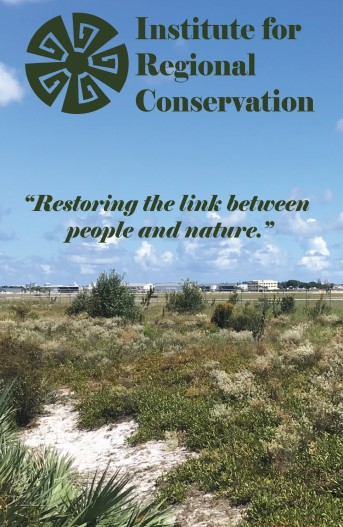About Us
Mission
A private non-profit organization, The Institute for Regional Conservation (IRC) is dedicated to the protection, restoration, and long-term management of biodiversity on a regional basis, and to the prevention of local extinctions of rare plants, animals and ecosystems.
Vision
Uniting people and nature to restore our world.

Our Work
Founded in 1984, IRC promotes an innovative approach to conservation. We seek to protect - and restore - viable populations of all native plant and animal species within key regions by designing conservation strategies powered by rich, geographically-distributed data. Our approach adds critical value to traditional conservation strategies focused on charismatic animals or species with small global ranges. This work is especially important in regions of the world where rapid fragmentation of habitats has been experienced, or is expected. For more than two decades we have focused our field work in Florida and the Caribbean, but we are also engaged in high-level dialog on ecological restoration and biodiversity targets more broadly around the world. We work in four domains: developing regional conservation models to advise and direct conservation strategies by diverse actors across broad regions; applied conservation science for researchers and land managers; ecological restoration and management; and, engaging with local communities to bring this work to fruition in the context of sustainability.
Headquarters
Our headquarters are in Delray Beach, Florida, USA.
Highlights
- We compiled information online on more than 2,500 species of plants found in more than 400 conservation areas as part of The Floristic Inventory of South Florida.
- We published IRC’s critically acclaimed book Rare Plants of South Florida: Their History, Conservation, and Restoration (2002), which emphasized the alarming loss of species in the region and provided detailed species accounts of the rarest 350 species.
- Working with the U.S. Fish and Wildlife Service and other partners, we have studied and contributed to the federal listing of numerous species of rare plants in Florida, including the Florida bristle fern and sand flax. In the 1990s, testimony by IRC scientists led to the listing of nearly 80 species of plants as endangered or threatened by the State of Florida. In 2015, we published a major report on over a decade of work on the rarest plants in Everglades National Park. Consistent with our holistic approach, we have recently expanded our work to include animals and plant animal relationships.
- We have developed conservation tools for the general public, including Natives For Your Neighborhood, which uses zip codes to provide targeted information on more than 600 species of native plants that can be used for natural gardening and ecological restoration in South Florida.
- We developed the bilingual website Plantas de la Isla de Puerto Rico / Plants of the Island of Puerto Rico, which provides preliminary conservation assessments for more than 800 of the rarest plants on the island, together with a companion Facebook page. We also have produced a preliminary website for the Mexican Yucatan (Plantas del Mayab), and an have upcoming website for the Bahama Archipelago in development.
- Over the last decade, IRC restoration crews have worked with the Florida Fish and Wildlife Conservation Commission's Upland Invasive Plant Management Program, the U.S. Fish and Wildlife Service and the U.S. Department of Defense to eradicate invasive plants on thousands of acres in Florida and the Caribbean.
- We actively work on the restoration of degraded ecosystems, and the reintroduction and augmentation of rare plants, including in globally-imperiled pine rocklands, tropical hardwood forests, mangrove ecosystems and coastal uplands.
- We collaborate with numerous other non-profit organization to promote the protection and restoration of biodiversity in Florida and around the world. We believe that only through collaborative efforts can we achieve our goals. We also work with business and non-profit organizations in our home community, including the Delray Beach Chamber of Commerce, Community Greening, and Keep Palm Beach Beautiful.
Support and Funding
IRC does not have an endowment, a major benefactor, or an army of dues paying members. We are funded through gifts, grants, agreements and contracts to implement conservation projects and programs. Significant funding has come from the U.S. Fish and Wildlife Service, National Park Service, State of Florida, and the Elizabeth Ordway Dunn Foundation, among many others. Some of our free web resources, such as Natives For Your Neighborhood, are partially funded by sponsors for whom we are grateful. Among the most critical are unrestricted donations, which allow us to produce cutting edge conservation resources that otherwise would not be possible. Please consider supporting our mission to make the world a better place.
Please visit IRC's programs page to learn more about our work. Also, see our projects, publications and presentations pages for more details about our activities.



